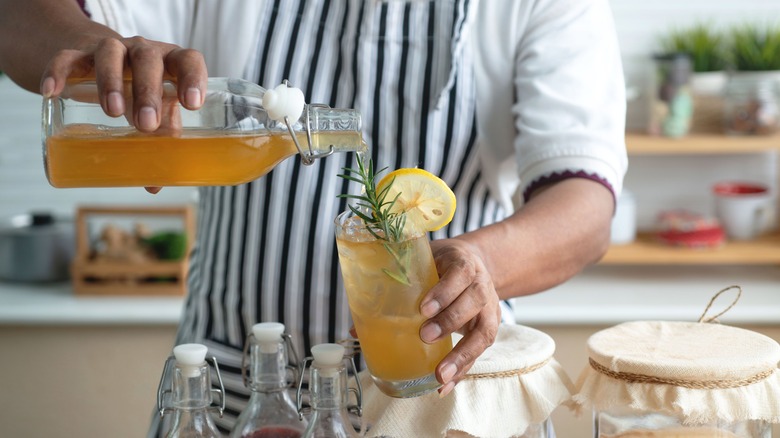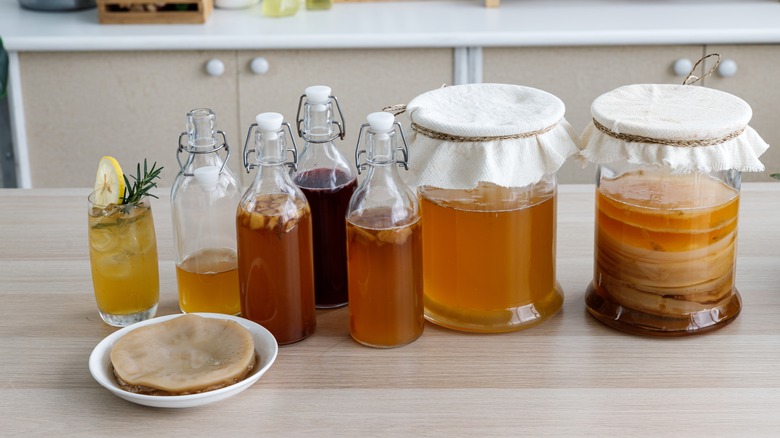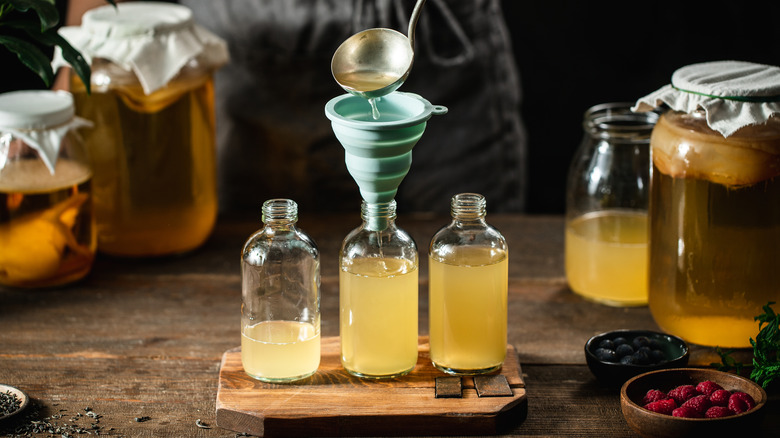How Much Caffeine (And Alcohol) Is Actually In Your Kombucha
Growing interest in kombucha has made it immensely popular, both as a project for homebrewers and a commercial bottled beverage you can buy in most grocery stores. The live cultures in this drink, made from tea, sugar, and a living organism called SCOBY (short for symbiotic culture of bacteria and yeast), offer probiotic benefits similar to those of yogurt, kimchi, and miso.
But because kombucha is a live product, it comes with some additional concerns from consumers. The fermentation process through which kombucha is made can produce a small amount of alcohol, though this is largely regulated by the federal government. Most kombucha that you buy in stores is legally considered non-alcoholic, though it may contain trace amounts of alcohol. (This story is a little different for homemade kombucha, however.) As kombucha is also made with tea, its caffeine content is also up for debate. But it likely won't have enough caffeine or alcohol to give you any kind of buzz.
How much caffeine is in kombucha?
When making kombucha, there is a lot of sugar and tea (generally plain black tea and sometimes green tea) that goes into the mixture that will, over time, become kombucha. But the SCOBY, which forms the mushroom-like cap on a fermenting batch of 'booch, eats sugar and tea to survive, producing kombucha as a byproduct. So most of the sugar and tea (including the caffeine in it) are eaten in the process, resulting in something that is way less sugary and caffeinated than the sum of its parts.
The average cup of black coffee has just shy of 100mg of caffeine per 8-ounce serving. Black tea has about 50mg, and green tea has about 30mg. But an 8-ounce serving of kombucha will contain between 6mg and 15mg, depending on the brand. That's potentially less than half of what's inside a cup of green tea, but keep in mind that many kombucha brands sell bottles containing at least two servings, so you'll have to double that if you plan on drinking the whole thing.
How much alcohol is in kombucha?
Because kombucha is made through fermentation, alcohol is a natural byproduct. But even unadulterated, homemade kombucha will never produce a high enough alcohol content to get you buzzed. At max, it will have between 1% to 2.5% ABV. But one of the things you probably didn't know about kombucha is that to be sold in U.S. stores as a non-alcoholic beverage, it is required to have less than 0.5% alcohol. So most commercial kombucha is put through a de-alcoholization process before bottling. There are very few exceptions to this. A select number of retailers such as Whole Foods sell GT's Classic Kombucha, which is not dealcoholized, so you must be over 21 to purchase it. But even this kombucha does not exceed 1% ABV. (All other GT's kombucha products, except for their Hard Kombucha, are kept under 0.5%.)
It is difficult to monitor the exact alcohol content of kombucha because it will continue to ferment on store shelves or in transport if not kept at cold enough temperatures. But you can be sure that if you purchase commercially produced kombucha, and you're never asked for your ID, your beverage is legally non-alcoholic, and will not get you inebriated.



